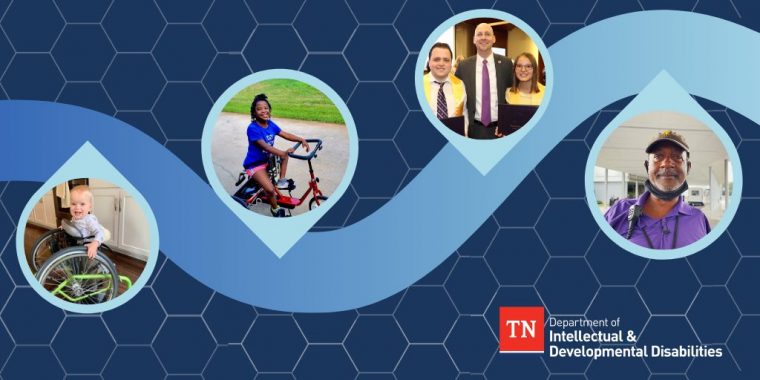
For over a decade, the Department of Intellectual and Developmental Disabilities has worked to transform disability services for the 24,000 adults and children with intellectual and developmental disabilities receiving services and supports across the state. With person-centeredness at the forefront, DIDD is continuously working to create the most effective and efficient service-delivery system in the nation with new programs and policies that will support Tennesseans with disabilities from birth through adulthood to live the lives they envision for themselves.
This lifespan of supports begins with Tennessee Early Intervention System (TEIS), a voluntary educational program for infants and toddlers that have disabilities or developmental delays. Recently, the department has started to lay the groundwork to expand early intervention services for children enrolled in the program. If approved by the Tennessee General Assembly and U.S. Department of Education, this expansion will make sure children across the state have a chance to succeed in school and in life by giving families the option to remain in the program after an eligible child’s 3rd birthday.
More children than ever are receiving services and supports through the Tennessee Early Intervention System (TEIS) and moving on to receive services through the Katie Beckett Program. At 12 months old, Asa started receiving physical therapy through TEIS. Now 10, she was able to purchase an adaptive tricycle through the Katie Beckett Program that helps her continue reaching her physical therapy milestones and allows her to enjoy time spent with family outdoors. The Katie Beckett Program provides supports and services to Asa and many other children across the state through the age of 18. Watch Asa’s video here: https://fb.watch/bl0XeugBi0/
The newest program to DIDD introduced in Governor Bill Lee’s Fiscal Year 2023 proposed budget is Medicaid Alternative Pathways to Independence or MAPs. This program introduces tools and concepts that connect enabling technology, employment services, peer mentoring, and more to enable and empower people living with intellectual and developmental disabilities so they can learn sustainable independence and find pathways to individual success. This new program is expected to help 1,250 people, either exiting the school system or who have recently exited and may be waiting for traditional waiver services, identify community interests and resources by building their own Virtual Community Resource Map (VCRM), establish true and meaningful community networks, and develop independent living skills. Through Pre-Employment Innovation, one of the many exciting features in the MAPs program, Shirley used technology to learn about different kinds of work, identify job interests and skills, and gain a better understanding of what supports she needed and found a new job at her local Food City. Watch Shirley’s video here: https://fb.watch/8XQZaVO-gk/
Through Tennessee Believes, DIDD is ensuring that students who want to pursue post-secondary education have the opportunity to attend universities and colleges throughout the state. This year, 4 colleges and universities across the state received grants to create new inclusive programs for students with disabilities and new opportunities within existing programs. These grants increase opportunities for students with intellectual and developmental disabilities as they prepare for independence and employment.
The newest DIDD programs set persons supported on a pathway to increased independence and full participation within their communities as DIDD works towards a single, seamless system for long-term services and supports. This alignment will build upon the successes seen through the Home and Community Based Services programs and align many processes and systems reducing the administrative burden on providers as DIDD works to become the nation’s most person-centered and cost-effective service delivery system while supporting Tennesseans with disabilities through their lifespan.